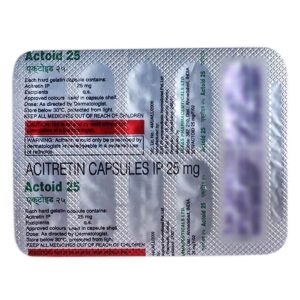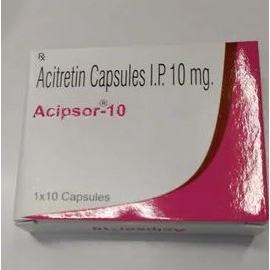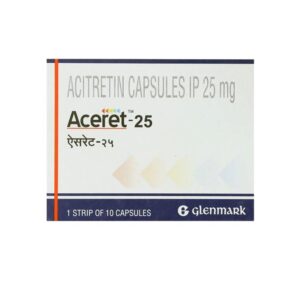ACITRETIN
ACITRETIN: Acitretin is a medication primarily used to treat severe psoriasis, a chronic autoimmune skin condition. It belongs to a group of medications known as retinoids, which are synthetic derivatives of vitamin A.
The exact mechanism of action of acitretin in treating psoriasis is not fully understood. However, it is believed to work by regulating the growth and differentiation of skin cells, reducing inflammation, and suppressing the immune response involved in psoriasis.
Acitretin is available in oral capsule form and is usually taken once daily with food. The dose may vary depending on the individual’s response and the severity of their psoriasis. Initially, a low dose is prescribed, and it is then gradually increased to achieve the desired therapeutic effect. The typical maintenance dose ranges from 25 to 50 mg daily.
As with any medication, acitretin may cause side effects. Common side effects include dry skin, dry eyes, dry mouth, dry nose, hair loss, headache, tiredness, and joint pain. These side effects are usually mild and improve over time. However, if they become bothersome or persistent, it is important to consult a healthcare professional.
It is crucial to note that acitretin can cause birth defects if taken during pregnancy. Due to this potential risk, it is recommended to avoid becoming pregnant for at least three years after stopping acitretin treatment. Women of childbearing age should use reliable contraception methods while taking acitretin and for a significant period after discontinuation.
Acitretin also has the potential to increase cholesterol and triglyceride levels in the blood, and regular monitoring of lipid levels is recommended during treatment. Additionally, the drug may cause liver damage, so liver function tests should be performed periodically.
Acitretin may interact with other medications, including certain antibiotics, contraceptives, and systemic retinoids. It is important to inform the healthcare provider of all medications being taken to avoid potential drug interactions.
Overall, acitretin is an effective treatment option for severe psoriasis but should be used with caution due to its potential side effects. It is important to discuss the risks and benefits of using acitretin with a healthcare professional before starting this medication.



